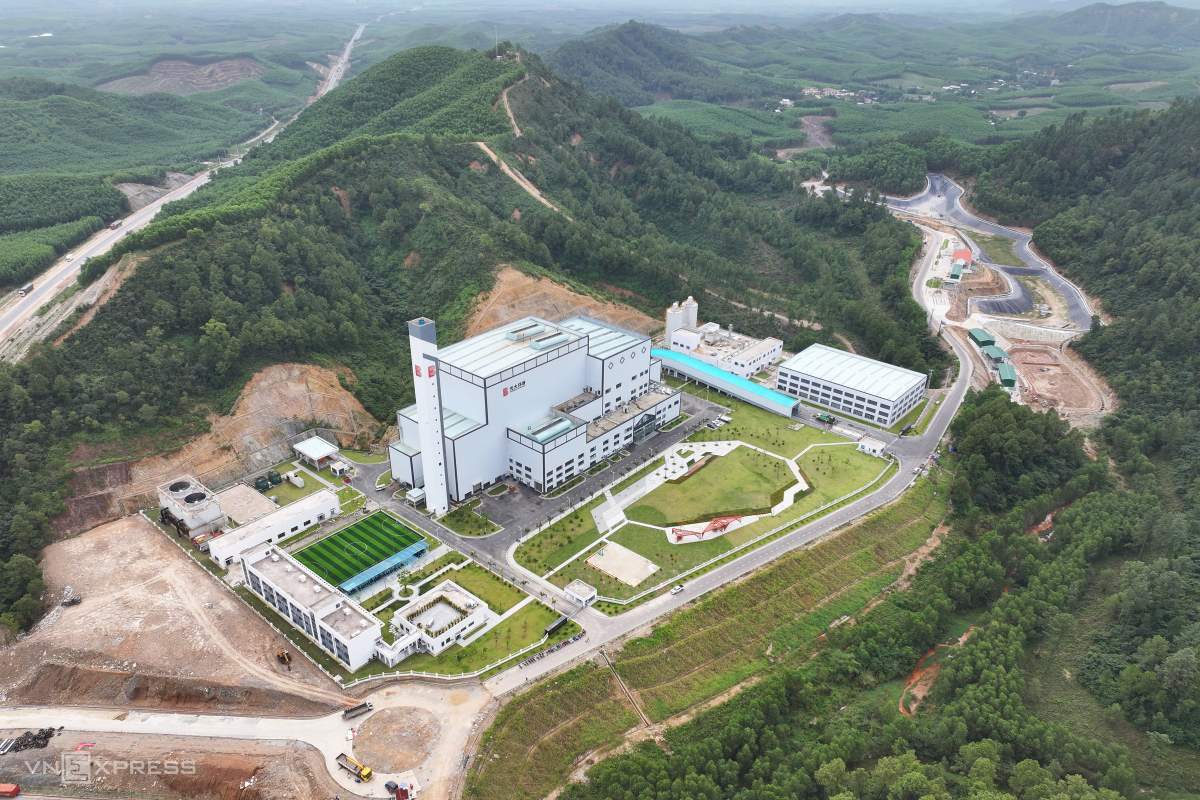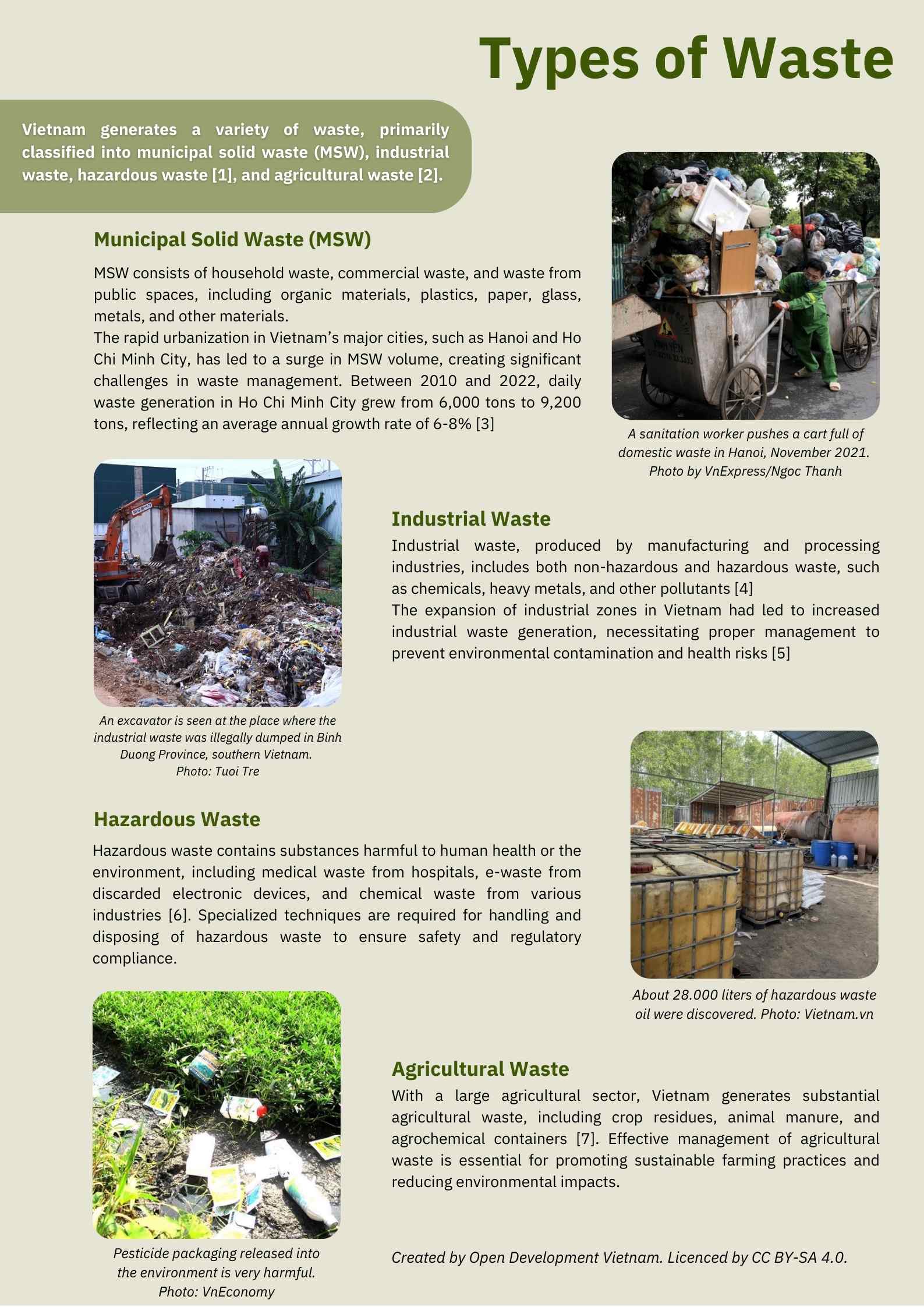Vietnam, a rapidly developing nation in Southeast Asia, is undergoing significant economic growth, industrialisation, and urbanization. While these advancements have boosted the economy, they have also led to increased waste generation and complex waste management challenges. Effective waste management is crucial for maintaining environmental sustainability, protecting public health, and enhancing overall quality of life.
Key Policies and Regulations
The Vietnamese government has enacted several policies and regulations to tackle waste management issues. These initiatives aim to reduce waste generation, promote recycling and reuse, and ensure safe disposal of waste.
Current Initiatives and Success Stories
Several initiatives and success stories highlight Vietnam’s progress in waste management. These initiatives involve government agencies, private companies, and non-governmental organizations (NGOs) working together to address waste challenges.
Waste Separation at Source
Waste separation at the source is piloted through projects in cities like Hanoi and Ho Chi Minh City, encouraging households and businesses to separate recyclable materials from organic and non-recyclable waste.11 This practice reduces the amount of waste sent to landfills and enhances recycling efficiency.
The Plastic Smart City project in Vietnam is part of a global initiative aimed at reducing plastic pollution in urban areas by encouraging cities to adopt sustainable practices and innovative solutions. The project is supported by WWF and focuses on creating models of cities that manage plastic waste effectively to prevent it from entering natural ecosystems, especially rivers and oceans. Eleven localities in Vietnam have committed to become plastic smart cities under this initiative, namely Phu Quoc and Rach Gia cities (Kien Giang province), Thanh Khe district (Da Nang city), Tuy Hoa city (Phu Yen province), Tan An city (Long An province), Hue city and A Luoi district (Thua Thien – Hue province), Ha Tinh city (Ha Tinh province), Con Dao district (Ba Ria – Vung Tau province), Dong Hoi city (Quang Binh province) and Cu Lao Cham (Quang Nam province). These localities are working to implement strategies to reduce plastic waste and improve waste management practices. This project is a significant step towards reducing plastic pollution and creating more sustainable urban environments in Vietnam.12
Public-Private Partnerships (PPPs)
Public-private partnerships have been instrumental in improving waste management infrastructure. For instance, several waste-to-energy (WtE) plants have been established through collaborations between the government and private companies. These plants convert waste into energy, reducing landfill use and providing a sustainable energy source .

A waste treatment plant in Phu Son Commune in Huong Thuy Town, 22 km from Hue City, is being built by China’s Everbright Environment Company at a cost of VND1.7 trillion (US$69.1 million). Photo by VNExpress.
Community-Based Initiatives
Community-based initiatives have also contributed to waste management success. NGOs and local organizations play a crucial role in conducting awareness campaigns, clean-up drives, and recycling programs. These efforts educate the public about the importance of waste management and encourage active participation in waste reduction and recycling.
Models of Circular Economy
Several businesses in Vietnam are adopting circular economy models, such as collecting and recycling used plastic bottles into new products like clothing and construction materials. These initiatives not only reduce plastic waste but also create economic opportunities and promote sustainable practices.13
Challenges
Future Directions
To address these challenges and improve waste management, Vietnam should consider several future directions:
- Investing in Infrastructure: Expanding and modernizing waste management infrastructure, including recycling facilities and WtE plants, is crucial. Public-private partnerships can play a significant role in attracting investment and expertise.14
- Promoting Circular Economy: Emphasizing circular economy principles can reduce waste generation and enhance resource efficiency. Encouraging businesses to adopt sustainable practices and design eco-friendly products is essential.15
- Enhancing Education and Outreach: Comprehensive education and outreach programs can raise public awareness about waste management. Schools, communities, and media campaigns can play a pivotal role in promoting responsible waste practices.16
- Strengthening Policy and Regulation: Continuously updating and enforcing waste management policies and regulations is necessary. Integrating EPR and other innovative approaches can drive compliance and sustainability.17
- Leveraging Technology: Utilizing advanced technologies, such as waste-to-energy conversion and digital waste tracking systems, can improve waste management efficiency and reduce environmental impact.18
Vietnam’s waste management system is at a critical juncture, facing significant challenges but also presenting numerous opportunities for improvement. By adopting a comprehensive and integrated approach that involves government, businesses, and the public, Vietnam can achieve sustainable waste management practices. Investing in infrastructure, promoting circular economy principles, enhancing public awareness, and enforcing regulations will pave the way for a cleaner, healthier, and more sustainable future. Through collaborative efforts and innovative solutions, Vietnam can effectively manage its waste and contribute to global environmental sustainability.
References
- 1. The World Bank. 2018. Solid and Industrial Hazardous Waste Management Assessment. Accessed in August, 2024
- 2. Nhan Dan News. 2023. Reducing environmental pollution in agricultural production. Accessed in August, 2024
- 3. Le, P. G., Le, H. A., Dinh, X. T., & Trinh, H. H. 2023. An assessment of the current situation and recommendation of management scenarios for municipal solid waste management in Ho Chi Minh city. Ministry of Science and Technology Vietnam, 65(2), 45–56. Accessed in August, 2024.
- 4. Thai, N. T. K. 2009. Hazardous industrial waste management in Vietnam: current status and future direction. Journal of Material Cycles and Waste Management, 11(3), 258–262. Accessed in August, 2024
- 5. Tran, M. D. 2021. Waste source owners in the industrial solid waste management in Vietnam. E3S Web of Conferences, 258, 08010. Accessed in August, 2024
- 6. Vietnam Forest Certification Office. 2022. Management and use of Chemicals and waste. Accessed in August, 2024.
- 7. Son, N. H. 2021. The Current Status of Agricultural Wastes and Residuals Management and Recycling in Vietnam. FFTC Agricultural Policy Platform (FFTC-AP). Accessed in August, 2024
- 8. Government of Vietnam. 2009. National Strategy on Integrated Solid Waste Management. Accessed in August, 2024.
- 9. Government of Vietnam. 2020. Environmental Protection Law. Accessed in August, 2024.
- 10. VnEconomy. 2024. Vietnam’s Extended Producer Responsibility: Potential and Pitfalls on the Road to a Circular Economy. Accessed in August, 2024.
- 11. Vietnam News. 2023. Việt Nam accelerating efforts to mitigate plastic pollution through NPAP operation. Accessed in August, 2024
- 12. WWF. The Plastic City Project in Vietnam. Accessed in August, 2024
- 13. Vietnam plus. 2023. Circular economy a choice for sustainable development. Accessed in August, 2024
- 14. Tanveer, M., Khan, S. a. R., Umar, M., Yu, Z., Sajid, M. J., & Haq, I. U. 2022. Waste management and green technology: future trends in circular economy leading towards environmental sustainability. Environmental Science and Pollution Research, 29(53), 80161–80178. Accessed in August, 2024
- 15. Ta, Y. T., Nguyen, T. T. A., & Nguyen, N. H. 2023. Identifying key areas for circular economy: a waste collection input–output analysis in Vietnam. Environment Development and Sustainability. Accessed August, 2024
- 16. Ibid
- 17. Tanveer, M., Khan, S. a. R., Umar, M., Yu, Z., Sajid, M. J., & Haq, I. U. 2022. Waste management and green technology: future trends in circular economy leading towards environmental sustainability. Environmental Science and Pollution Research, 29(53), 80161–80178. Accessed in August, 2024
- 18. Ibid


